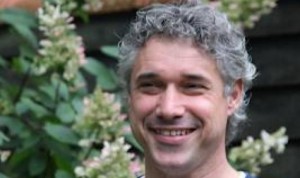Interview Rico Schuijers
 Dr. Rico Schuijers, sports psychologist
Dr. Rico Schuijers, sports psychologist
www.100graden.com
Apply sports psychology
to help scientists excel
Dr. Rico Schuijers – who successfully coached Dutch Olympic teams in 2008 and 2012 – says the psychology of performance applies to scientists as well. ”The needs of scientists cannot be translated into a skills set only. Their scientific institutes can support high-pressure performance and excellence of scientists using a four-step model from sports psychology”.
Schuijers has his own company since 1990 and is one of only six sports psychologists PhDs in The Netherlands. He was the head of performance management for the Netherlands Olympic Committee in preparation of the 2012 Olympic Games in London. But he is most famous for mentally coaching the Dutch ladies water polo and field hockey teams at the Olympic games in Beijing in 2008. Both of the teams won the gold medal that year. What is his secret, and how can we apply this to the performance of scientists?
“You see, we used to think that training skills was everything. I still meet trainers and coaches who think that. But 30 years of sports psychology research and practice has taught us that mental aspects make the difference between elite athletes. For instance, you can teach someone to run fast, but why do they sometimes perform badly under pressure, during the actual contest? Since we require more and more from scientists – we want them to compete and excel in both education and research and be strong leaders – they too perform under high pressure. Scientists may recognise that presenting for a committee, or making strategic choices and prioritising competing roles in leadership demands mental strength. Scientific organisations experience that change may not occur simply based on skills training. I am happy to see that ElroyCOM incorporates such mental aspects in their training.
Our science based four-step model includes motivation, energy/stress management, concentration and self-confidence. Training and coaching on such aspects empowers scientists in their effectiveness and well-being.
During my workshop I intend to conduct an interactive game that addresses all four aspects of our mental strength model. Participants – HRM advisors and scientists – will experience how these four success factors will influence and strengthen the way they perform individually and function in their organisation”.
Dr. Rico Schuijers
Example references:
- Singer, R.N., Murphey, M.,& Tennant, L.K. (Eds.) (1993). Handbook of research on sport psychology. New York: Macmillan.
- Schuijers, R. (2004). Mentale training in de sport. Maarssen: Elsevier.
- Gabler, H., Nitsch, J.R., & Singer, R. (2000). Einfuhrung in die Sportpsychologie. Teil 1: Grundthemen, 3rd ed. Schorndorf: Karl Hofmann.
- Nideffer, R.M. (1986). Concentration and Attention Control Training. In: J.M. Williams, (Ed.), Applied Sport Psychology (pp 257-269). Mountain View, CA: Mayfield.
- Orlick, T. (1998). Embracing your potential. Champaign, Ill: Human Kinetics.
- Williams, J.M. (ed.) (1986). Applied sport psychology: personal growth to peak performance. Mountain View, CA: Mayfield.

